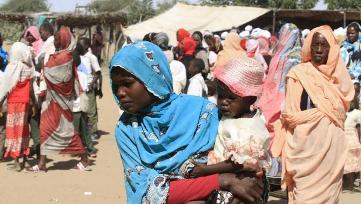UN urges Sudan to allow full probe into mass rape claims in Darfur
February 13, 2015 (KHARTOUM) – The United Nations deputy secretary-general Jan Eliasson on Thursday has expressed concern over mass rape allegations in Darfur and urged Khartoum to allow full investigation on the incident.

Following these allegations, Sudanese authorities initially prevented a verification team from the hybrid peacekeeping mission (UNAMID) from probing the claim but allowed them to visit the area later.
After the visit, UNAMID said they found no evidence confirming the mass rape claims.
However, Sudanese officials were angered by the remarks of UN officials who stressed the need for further investigation mentioning the heavy presence of military and police during the first probe.
Since then, Sudan refused to authorise a second investigation and called publicly for an exit strategy for the joint mission from Darfur.
However, a report released by by Human Rights Watch this week reiterated that the Sudanese soldiers raped Tabit women.
Eliasson met with the Sudanese presidential assistant Ibrahim Ghandour on Thursday in the presence of the UN peacekeeping chief, Hervé Ladsous.
According to a statement by the UN spokesperson Stéphane Dujarric, Eliasson “expressed concern over continued allegations of mass rape in the village of Tabit in Darfur”, urging the Sudanese government to allow UN peacekeeping mission in Darfur (UNAMID) access to carry out a full investigation into the incident.
Sudan’s official news agency SUNA said on Friday that Ghandour dismissed the allegations, pointing to the probe conducted by the government besides the investigation carried out by UNAMID.
According to SUNA, Ghandour underscored the government has enough documents to prove that those claims didn’t take place.
A report released on Wednesday, Human Rights Watch (HRW) stressed the Sudanese government troops carried out mass rape against women and girls in Tabit late last year.
The US-based watchdog said it interviewed 15 survivors and one female witness who provided first-hand information about 27 incidents of rape.
Twenty-three other “credible sources” provided information about an additional 194 incidents of rape, HRW said in its 48-page report.
On Wednesday, the UN Secretary General Ban Ki-Moon called on Khartoum to allow a UNAMID mission to investigate the rape claims and to allow “safe, unhindered access to the town”.
Meanwhile, SUNA said that Ghandour briefed Eliasson on the recent political developments in Sudan including his visit to Washington, national dialogue, situation in Darfur and talks with the rebel Sudan People’s Liberation Movement/North on the Two Areas.
It said that Eliasson praised the government-led national dialogue, expressing UN’s desire to cooperate with Sudan in various domains particularly development projects.
Ghandour for his part emphasised his government commitment to cooperate with the UN in all domains particularly on UNAMID’s exit strategy from Darfur.
MEETING WITH AFRICAN AMBASSADORS
Meanwhile, Ghandour met on Thursday with African ambassadors to the UN at the UN headquarters in New York.
He thanked them for their continuous support to Sudan, praising African Union’s recent decisions regarding the International Criminal Court (ICC).
The presidential aide briefed the ambassadors on the previous rounds of talks with the SPLM-N on the Two Areas besides preparations for the coming round which is expected to take place within two weeks.
He pointed the two delegation were close to sign a framework agreement on the bases of the UN Security Council resolution 2046 but they disagreed on two issues including provision of the humanitarian assistance to the affected and the implementation of the ceasefire.
Ghanour pointed out the government seeks to achieve a comprehensive ceasefire while the SPLM-N wants a renewable cessation of hostilities.
The Blue Nile and South Kordofan’s conflict erupted months apart from each other in 2011 when Sudan attempted to forcibly disarm SPLM-N fighters it accuses of being backed by their brother-in-arms in the South Sudanese army.
The two sides failed to sign a peace deal following nine rounds of talks.
The presidential assistant also briefed the ambassadors on the situation in Sudan following the signing of the Comprehensive Peace Agreement (CPA) and how the international community repudiated commitments it made at the time of the signing of the deal.
(ST)
